2022年考研考博-考博英语-西南政法大学考试全真模拟易错、难点剖析AB卷(带答案)试题号:4
2022年考研考博-考博英语-西南政法大学考试全真模拟易错、难点剖析AB卷(带答案)试题号:52
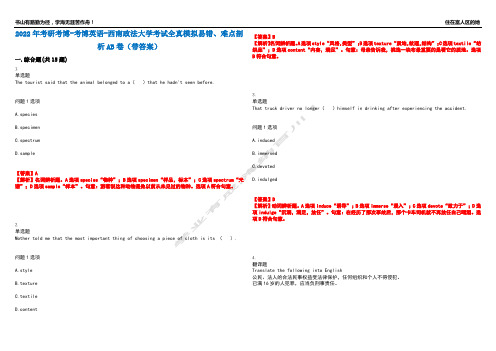
2022年考研考博-考博英语-西南政法大学考试全真模拟易错、难点剖析AB卷(带答案)一.综合题(共15题)1.单选题The tourist said that the animal belonged to a()that he hadn't seen before.问题1选项A.speciesB.specimenC.spectrumD.sample【答案】A【解析】名词辨析题。
A选项species“物种”;B选项specimen“样品,标本”;C选项spectrum“光谱”;D选项sample“样本”。
句意:游客说这种动物是他以前从未见过的物种。
选项A符合句意。
2.单选题Mother told me that the most important thing of choosing a piece of cloth is its (). 问题1选项A.styleB.textureC.textileD.content 【答案】B【解析】名词辨析题。
A选项style“风格,类型”;B选项texture“质地,纹理,结构”;C选项textile“纺织品”;D选项content“内容,满足”。
句意:母亲告诉我,挑选一块布最重要的是看它的质地。
选项B符合句意。
3.单选题That truck driver no longer()himself in drinking after experiencing the accident.问题1选项A.inducedB.immersedC.devotedD.indulged【答案】D【解析】动词辨析题。
A选项induce“诱导”;B选项immerse“浸入”;C选项devote“致力于”;D选项indulge“沉溺,满足,放任”。
句意:在经历了那次事故后,那个卡车司机就不再放任自己喝酒。
选项D符合句意。
4.翻译题Translate the following into English公民、法人的合法民事权益受法律保护,任何组织和个人不得侵犯。
2022年考研考博-考博英语-西南政法大学考试全真模拟易错、难点剖析AB卷(带答案)试题号:51
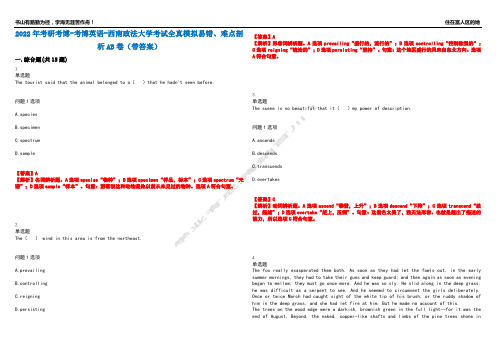
2022年考研考博-考博英语-西南政法大学考试全真模拟易错、难点剖析AB卷(带答案)一.综合题(共15题)1.单选题The tourist said that the animal belonged to a()that he hadn't seen before.问题1选项A.speciesB.specimenC.spectrumD.sample【答案】A【解析】名词辨析题。
A选项species“物种”;B选项specimen“样品,标本”;C选项spectrum“光谱”;D选项sample“样本”。
句意:游客说这种动物是他以前从未见过的物种。
选项A符合句意。
2.单选题The() wind in this area is from the northeast.问题1选项A.prevailingB.controllingC.reigningD.persisting 【答案】A【解析】形容词辨析题。
A选项preva iling“盛行的,流行的”;B选项controlling“控制欲强的”;C选项reigning“统治的”;D选项persisting“坚持”。
句意:这个地区盛行的风来自东北方向。
选项A符合句意。
3.单选题The scene is so beautiful that it()my power of description.问题1选项A.ascendsB.descendsC.transcendsD.overtakes【答案】C【解析】动词辨析题。
A选项asce nd“攀登,上升”;B选项descend“下降”;C选项transcend“胜过,超越”;D选项overtake“赶上,压倒”。
句意:这景色太美了,我无法形容。
也就是超出了描述的能力,所以选项C符合句意。
4.单选题The fox really exasperated them both. As soon as they had let the fowls out, in the early summer mornings, they had to take their guns and keep guard; and then again as soon as evening began to mellow, they must go once more. And he was so sly. He slid along in the deep grass; he was difficult as a serpent to see. And he seemed to circumvent the girls deliberately. Once or twice March had caught sight of the white tip of his brush, or the ruddy shadow of him in the deep grass, and she had let fire at him. But he made no account of this.The trees on the wood edge were a darkish, brownish green in the full light—for it was the end of August. Beyond, the naked, copper-like shafts and limbs of the pine trees shone inthe air. Nearer the rough grass, with its long, brownish stalks all agleam, was full of light. The fowls were round about—the ducks were still swimming on the pond under the pine trees. March looked at it all, saw it all, and did not see it. She heard Banford speaking to the fowls in the distance—and she did not hear. What was she thinking about? Heaven knows. Her consciousness was, as it were, held back.She lowered her eyes, and suddenly saw the fox. He was looking up at her. His chin was pressed down, and his eyes were looking up. They met her eyes. And he knew her. She was spellbound—she knew he knew her. So he looked into her eyes, and her soul failed her. He knew her, he has not daunted.She struggled, confusedly she came to herself, and saw him making off, with slow leaps over some fallen boughs, slow, impudent jumps. Then he glanced over his shoulder, and ran smoothly away. She saw his brush held smooth like a feather, she saw his white buttocks twinkle. And he was gone, softly, soft as the wind.She put her gun to her shoulder, but even then pursed her mouth, knowing it was nonsense to pretend to fire. So she began to walk slowly after him, in the direction he had gone, slowly, pertinaciously. She expected to find him. In her heart she was determined to find him. What she would do when she saw him again she did not consider. But she was determined to find him. So she walked abstractedly about on the edge of the wood, with wide, vivid dark eyes, and a faint flush in her cheeks. She did not think. In strange mindlessness she walked hither and thither...As soon as supper was over, she rose again to go out, without saying why. She took her gun again and went to look for the fox. For he had lifted his eyes upon her, and his knowing look seemed to have entered her brain. She did not so much think of him: she was possessed by him. She saw his dark, shrewd, unabashed eye looking into her, knowing her. She felt him invisibly master her spirit. She knew the way he lowered his chin as he looked up, she knew his muzzle, the golden brown, and the greyish white. And again she saw him glance over his shoulder at her, half inviting, half contemptuous and cunning. So she went, with her great startled eyes glowing, her gun under her arm, along the wood edge. Meanwhile the night fell, and a great moon rose above the pine trees.1.At the beginning of the story, the fox seems to be all EXCEPT().2.As the story proceeds. March begins to feel under the spell of().3.Gradually March seems to be in a state of().4.At the end of the story, there seems to be a sense of()between March and the fox.5.The passage creates an overall impression of ().问题1选项A.cunningB.fierceC.defiantD.annoying问题2选项A.the lightB.the treesC.the nightD.the fox问题3选项A.blanknessB.imaginationC.sadnessD.excitement问题4选项A.detachmentB.angerC.intimacyD.conflict问题5选项A.mysteryB.horrorC.livelinessD.contempt.【答案】第1题:B第2题:D第3题:A第4题:C第5题:A【解析】1.细节事实题。
2022年考研考博-考博英语-西南大学考试全真模拟易错、难点剖析AB卷(带答案)试题号:84

2022年考研考博-考博英语-西南大学考试全真模拟易错、难点剖析AB卷(带答案)一.综合题(共15题)1.单选题When one has good health,()should feel fortunate.问题1选项A.youB.theyC.heD.we【答案】C【解析】考察人称代词的用法。
句意:当一个人拥有健康时,他应该感到幸运。
选项C符合题意。
2.单选题It was during summer breaks that we first taste the satisfaction work that ()into hard currency.问题1选项A.translatesB.transfersC.transplantsD.transmits 【答案】A【解析】考察动词词义辨析。
translate “变换”;transfer“移交,迁移”;transplant“移植(器官)”;transmit“传输,传播”。
句意:暑假期间,我们第一次品尝到了把劳动变成货币的滋味。
选项A符合题意。
3.单选题It is a generous and receptive intelligence that was ()from attaining its full scope by bad training, poor school and lack of opportunity.问题1选项A.foiledB.thwartedC.balkedD.inhabited【答案】C【解析】考察动词词义辨析。
foil “阻止;挫败”;thwart “反对,阻碍”;balk “故意妨碍或阻止”;inhabit “居住于”。
句意:糟糕的训练,落后的学校条件以及机会的缺失妨碍了一个慷慨乐于接受的大脑的完全开发。
选项C符合题意。
4.单选题The Space Age ()in October 1957 when the first artificial satellite was launched by the Soviet Union.问题1选项A.initiatedB.originatedC.embarkedmenced【答案】D【解析】考察动词词义辨析。
2022年考研考博-考博英语-西南大学考试全真模拟易错、难点剖析AB卷(带答案)试题号:8
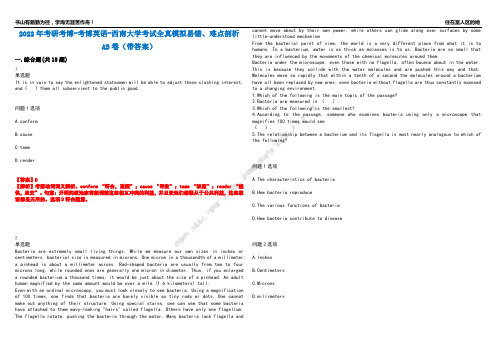
2022年考研考博-考博英语-西南大学考试全真模拟易错、难点剖析AB卷(带答案)一.综合题(共15题)1.单选题It is in vain to say the enlightened statesmen will be able to adjust these clashing interest, and()them all subservient to the public good.问题1选项A.conformB.causeC.tameD.render【答案】D【解析】考察动词词义辨析。
conform “符合,遵照”;cause “导致”;tame “驯服”;render “提供,呈交”。
句意:开明的政治家将能调整这些相互冲突的利益,并且使他们都服从于公共利益,这些靠说都是无用的。
选项D符合题意。
2.单选题Bacteria are extremely small living things. While we measure our own sizes in inches or centimeters, bacterial size is measured in microns. One micron is a thousandth of a millimeter: a pinhead is about a millimeter across. Rod-shaped bacteria are usually from two to four microns long, while rounded ones are generally one micron in diameter. Thus, if you enlarged a rounded bacterium a thousand times, it would be just about the size of a pinhead. An adult human magnified by the same amount would be over a mile (1.6 kilometers) tall.Even with an ordinal microscopy, you must look closely to see bacteria. Using a magnification of 100 times, one finds that bacteria are barely visible as tiny rods or dots. One cannot make out anything of their structure. Using special stains, one can see that some bacteria have attached to them wavy-looking "hairs" called flagella. Others have only one flagellum. The flagella rotate, pushing the bacteria through the water. Many bacteria lack flagella and cannot move about by their own power, while others can glide along over surfaces by some little-understood mechanismFrom the bacterial point of view, the world is a very different place from what it is to humans. To a bacterium, water is as thick as molasses is to us. Bacteria are so small that they are influenced by the movements of the chemical molecules around themBacteria under the microscope, even those with no flagella, often bounce about in the water. This is because they collide with the water molecules and are pushed this way and that. Molecules move so rapidly that within a tenth of a second the molecules around a bacterium have all been replaced by new ones; even bacteria without flagella are thus constantly exposed to a changing environment.1.Which of the following is the main topic of the passage?2.Bacteria are measured in ().3.Which of the following is the smallest?4.According to the passage, someone who examines bacteria using only a microscope that magnifies 100 times would see().5.The relationship between a bacterium and its flagella is most nearly analogous to which of the following?问题1选项A.The characteristics of bacteriaB.How bacteria reproduceC.The various functions of bacteriaD.How bacteria contribute to disease问题2选项A.InchesB.CentimetersC.Micronslimeters问题3选项A.A pinheadB.A rounded bacteriumC.A microscopeD.A rod-shaped bacterium问题4选项A.tiny dotsB.small ’’hairs”rge rodsD.detailed structures问题5选项A.A rider jumping on a horse's backB.A ball being hit by a batC.A boat powered by a motorD.A door closed by a gust of wind.【答案】第1题:A第2题:C第3题:B第4题:A第5题:A【解析】1.文章主要介绍了细菌“小”的这个特点(Bacteria are extremely small living things)。
2022年考研考博-考博英语-西南大学考试全真模拟易错、难点剖析AB卷(带答案)试题号:48
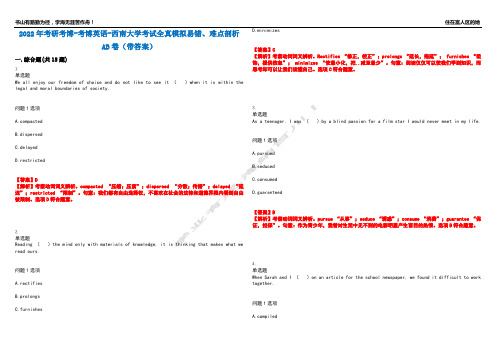
2022年考研考博-考博英语-西南大学考试全真模拟易错、难点剖析AB卷(带答案)一.综合题(共15题)1.单选题We all enjoy our freedom of choice and do not like to see it ()when it is within the legal and moral boundaries of society.问题1选项pactedB.dispersedC.delayedD.restricted【答案】D【解析】考察动词词义辨析。
compacted “压缩;压紧”;dispersed “分散;传播”;delayed “延迟”;restricted “限制”。
句意:我们都有自由选择权,不喜欢在社会的法律和道德界限内看到自由被限制。
选项D符合题意。
2.单选题Reading ()the mind only with materials of knowledge, it is thinking that makes what we read ours.问题1选项A.rectifiesB.prolongsC.furnishesD.minimizes【答案】C【解析】考察动词词义辨析。
Rectifies “修正,校正”;prolongs “延长,拖延”;furnishes “装饰,提供信息”;minimizes “使最小化,把..减至最少”。
句意:阅读仅仅可以使我们学到知识,而思考却可以让我们读懂自己。
选项C符合题意。
3.单选题As a teenager. I was ()by a blind passion for a film star I would never meet in my life. 问题1选项A.pursuedB.seducedC.consumedD.guaranteed【答案】B【解析】考察动词词义辨析。
pursue “从事”;seduce “诱惑”;consume “消费”;guarantee “保证,担保”。
2022年考研考博-考博英语-西南大学考试全真模拟易错、难点剖析AB卷(带答案)试题号:50
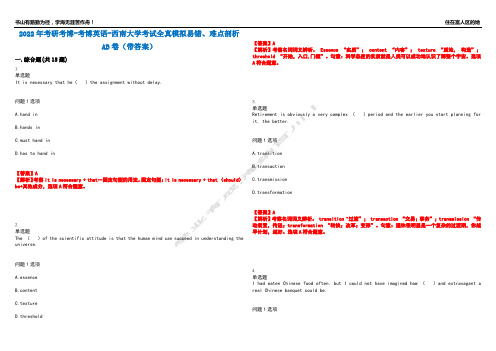
2022年考研考博-考博英语-西南大学考试全真模拟易错、难点剖析AB卷(带答案)一.综合题(共15题)1.单选题It is necessary that he()the assignment without delay.问题1选项A.hand inB.hands inC.must hand inD.has to hand in【答案】A【解析】考察it is necessary + that…固定句型的用法。
固定句型:It is necessary + that (should)be+其他成分,选项A符合题意。
2.单选题The ()of the scientific attitude is that the human mind can succeed in understanding the universe.问题1选项A.essenceB.contentC.textureD.threshold 【答案】A【解析】考察名词词义辨析。
Essence “实质”;content “内容”;texture “质地,构造”;threshold “开始,入口,门槛”。
句意:科学态度的实质就是人类可以成功地认识了解整个宇宙。
选项A符合题意。
3.单选题Retirement is obviously a very complex ()period and the earlier you start planning for it, the better.问题1选项A.transitionB.transactionC.transmissionD.transformation【答案】A【解析】考察名词词义辨析。
transition "过渡”;transaction “交易;事务”;transmission “传动装置,传送;transformation “转换;改革;变形”。
句意:退休很明显是一个复杂的过渡期,你越早计划,越好。
2022年考研考博-考博英语-西南政法大学考试全真模拟易错、难点剖析AB卷(带答案)试题号:37

2022年考研考博-考博英语-西南政法大学考试全真模拟易错、难点剖析AB卷(带答案)一.综合题(共15题)1.单选题I must leave now.()if you want that book I will bring it tomorrow.问题1选项A.OccasionallyB.AccidentallyC.IncidentallyD.Subsequently【答案】C【解析】副词辨析题。
A选项Occasionally“偶尔,间或”;B选项Accidentally“意外地,偶然地”;C选项Incidentally“顺便,附带地”;D选项Subsequently“随后,后来”。
句意:我必须得离开了。
顺便说一句,如果你想要那本书,我明天就带过来。
选项C符合语境。
2.单选题China’s resuming exercise of sovereignty over Hong Kong and Macao is()of Chinese prosperity.问题1选项A.indulgentB.indifferentC.indignantD.indicative【答案】D【解析】形容词辨析题。
A选项indulgent“放纵的,宽容的”;B选项indifferent“冷淡的,中立的”;C选项indignant“愤愤不平的”;D选项indicative“象征的”。
句意:中国恢复对香港和澳门行使主权,象征着中国繁荣昌盛。
选项D符合句意。
3.翻译题We must continue with the reform in tax and fee in rural areas to lighten the burdens of farmers and protect their interests.China does not seek hegemony or predominance in world affairs. It advocates a new international political and economic order.If we do not crack down on corruption, the flesh-and-blood ties between the Party and the people will suffer a lot and the Party will be in danger of losing its ruling position, or possibly heading for self-destruction.Nobody in any sector, public or private, should offer benefits unless for a good reason. Dams are a dramatic example of a human activity that degrades freshwater ecosystems.【答案】为了减轻农民的负担和保护他们的利益,我们一定要继续进行农村税费改革。
2022年考研考博-考博英语-西南大学考试全真模拟易错、难点剖析AB卷(带答案)试题号:66
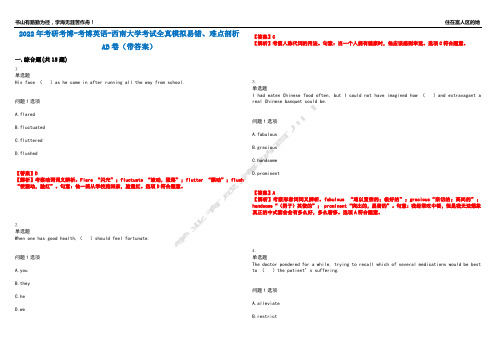
2022年考研考博-考博英语-西南大学考试全真模拟易错、难点剖析AB卷(带答案)一.综合题(共15题)1.单选题His face ()as he came in after running all the way from school.问题1选项A.flaredB.fluctuatedC.flutteredD.flushed【答案】D【解析】考察动词词义辨析。
Flare “闪光”;fluctuate “波动,涨落”;flutter “飘动”;flush “使激动,脸红”。
句意:他一路从学校跑回家,脸通红。
选项D符合题意。
2.单选题When one has good health,()should feel fortunate.问题1选项A.youB.theyC.heD.we 【答案】C【解析】考察人称代词的用法。
句意:当一个人拥有健康时,他应该感到幸运。
选项C符合题意。
3.单选题I had eaten Chinese food often, but I could not have imagined how ()and extravagant a real Chinese banquet could be.问题1选项A.fabulousB.graciousC.handsomeD.prominent【答案】A【解析】考察形容词词义辨析。
fabulous “难以置信的;极好的”;gracious“亲切的;高尚的”;handsome“(男子)英俊的”;prominent“突出的,显著的”。
句意:我经常吃中餐,但是我无法想象真正的中式宴会会有多么好,多么奢侈。
选项A符合题意。
4.单选题The doctor pondered for a while, trying to recall which of several medications would be best to ()the patient’s suffering.问题1选项A.alleviateB.restrictC.decreaseD.diminish【答案】A【解析】考察动词词义辨析。
2022年考研考博-考博英语-西南政法大学考试全真模拟易错、难点剖析AB卷(带答案)试题号:5
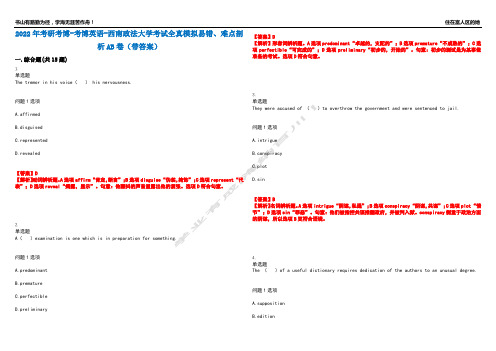
2022年考研考博-考博英语-西南政法大学考试全真模拟易错、难点剖析AB卷(带答案)一.综合题(共15题)1.单选题The tremor in his voice() his nervousness.问题1选项A.affirmedB.disguisedC.representedD.revealed【答案】D【解析】动词辨析题。
A选项affirm“肯定,断言”;B选项disguise“伪装,掩饰”;C选项represent“代表”;D选项reveal“揭露,显示”。
句意:他颤抖的声音显露出他的紧张。
选项D符合句意。
2.单选题A()examination is one which is in preparation for something.问题1选项A.predominantB.prematureC.perfectibleD.preliminary 【答案】D【解析】形容词辨析题。
A选项predominant“卓越的,支配的”;B选项premature“不成熟的”;C选项perfectible“可完成的”;D选项preliminary“初步的,开始的”。
句意:初步的测试是为某事做准备的考试。
选项D符合句意。
3.单选题They were accused of ()to overthrow the government and were sentenced to jail.问题1选项A.intrigueB.conspiracyC.plotD.sin【答案】B【解析】名词辨析题。
A选项intrigue“阴谋,私通”;B选项conspiracy“阴谋,共谋”;C选项plot“情节”;D选项sin“罪恶”。
句意:他们被指控共谋推翻政府,并被判入狱。
conspiracy侧重于政治方面的阴谋,所以选项B更符合语境。
4.单选题The ()of a useful dictionary requires dedication of the authors to an unusual degree. 问题1选项A.suppositionB.editionpilationD.construction【答案】C【解析】名词辨析题。
2022年考研考博-考博英语-西南政法大学考试全真模拟易错、难点剖析AB卷(带答案)试题号:22

2022年考研考博-考博英语-西南政法大学考试全真模拟易错、难点剖析AB卷(带答案)一.综合题(共15题)1.单选题I’m sure that I can soon()him into accepting our plan.问题1选项A.sayB.speakC.talkD.tell【答案】C【解析】考查固定搭配。
talk sb into...表示“说服某人做某事”。
句意:我确信我很快就能说服他接受我们的计划。
选项C符合句意。
2.单选题A building has two main structural functions. It must shelter people from the elements and it must transmit all loads safely to the ground. Loads are of two kinds, dead and live. Dead loads are those of the building itself. They vary in different parts of the building according to the heights and materials used.Engineers can easily calculate these loads, because they know the weights and positions of all the parts of the building. Live loads are the weights of the people and things in the building. Engineers have done research into live loadings and have produced statistics for all kinds of loads. They know, for example, that the normal floor loading of an office building is about 40 pounds for every square foot.In many countries, the greatest loadings allowed are stated in regulations. When authorities approve the design of a new building, they make sure that the building will safely take the loads stated. The calculations include a safety factor of three or four—that is, the structure is three or four times as it needed be to avoid collapse. The extra strength allows for occasional overloading and for small heavy loads, such as an office safe. The extra strength also allows for deterioration of the structure.The architect must design the building to stand up to wind pressures. And in some countries such as Japan, the building must also withstand earthquakes. Earthquakes cause abnormal stresses in a building's structure, especially at the joints between beams and columns.The main types of structure used to support building include load-bearing walls, frames and the shell structures. Architects may use space-frames and shells for large one-floored buildings, such as aircraft hangars, exhibition halls and swimming-pools. These structures can form wide-span roofs without any central support pillars. A space frame consists of a rigid network of metal girders. A shell may be of concrete or wood, forming a high arched roof. Many shell structures have beautiful geometrical shapes.1.An appropriate title for the above article should be().2.One of the main structural functions of a building is().3.The safety factor of a building must be().4.are the main types of structures used to support buildings().5.All the stresses are mentioned in the passage except().问题1选项A.The Methods of ConstructionB.The Contracting SystemC.The Principles of BuildingD.Constructing a Large Building问题2选项A.to provide shelter for people at nightB.to transmit all loads safely to the groundC.to stand up to wind pressureD.to serve as a kind decoration in the city问题3选项A.twice as strong as the wind pressure to avoid collapseB.three of four times as strong as it needed be to avoid collapseC.explained to the residents who live in the buildingD.reported to the government upon completion of the building问题4选项A.Wide-span roofs and shell structuresB.Pillars and columnsC.Concrete walls and framesD.Load-bearing walls, frames and shell structures问题5选项A.wind pressuresB.stresses caused by earthquakesC.rain pressureD.stresses of the building itself【答案】第1题:C第2题:B第3题:B第4题:D第5题:C【解析】1.主旨大意题。
2022年考研考博-考博英语-西南政法大学考试全真模拟易错、难点剖析AB卷(带答案)试题号:40
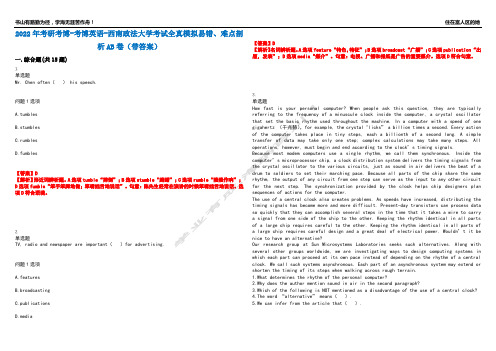
2022年考研考博-考博英语-西南政法大学考试全真模拟易错、难点剖析AB卷(带答案)一.综合题(共15题)1.单选题Mr. Chen often() his speech.问题1选项A.tumblesB.stumblesC.rumblesD.fumbles【答案】D【解析】形近词辨析题。
A选项tumble“摔倒”;B选项stumble“踌躇”;C选项rumble“隆隆作响”;D选项fumble“笨手笨脚地做;笨嘴拙舌地说话”。
句意:陈先生经常在演讲的时候笨嘴拙舌地说话。
选项D符合语境。
2.单选题TV, radio and newspaper are important()for advertising.问题1选项A.featuresB.broadcastingC.publicationsD.media 【答案】D【解析】名词辨析题。
A选项feature“特色,特征”;B选项broadcast“广播”;C选项publication“出版,发表”;D选项media“媒介”。
句意:电视、广播和报纸是广告的重要媒介。
选项D符合句意。
3.单选题How fast is your personal computer? When people ask this question, they are typically referring to the frequency of a minuscule clock inside the computer, a crystal oscillator that set the basic rhythm used throughout the machine. In a computer with a speed of one gigahertz (千兆赫),for example, the crystal "licks” a billion times a second. Every action of the computer takes place in tiny steps, each a billionth of a second long. A simple transfer of data may take only one step; complex calculations may take many steps. All operations, however, must begin and end according to the clock’s timing signals.Because most modem computers use a single rhythm, we call them synchronous. Inside the computer’s microprocessor chip, a clock distribution system delivers the timing signals from the crystal oscillator to the various circuits, just as sound in air delivers the beat of a drum to soldiers to set their marching pace. Because all parts of the chip share the same rhythm, the output of any circuit from one step can serve as the input to any other circuit for the next step. The synchronization provided by the clock helps chip designers plan sequences of actions for the computer.The use of a central clock also creates problems. As speeds have increased, distributing the timing signals has become more and more difficult. Present-day transistors can process data so quickly that they can accomplish several steps in the time that it takes a wire to carry a signal from one side of the chip to the other. Keeping the rhythm identical in all parts of a large chip requires careful to the other. Keeping the rhythm identical in all parts of a large chip requires caref ul design and a great deal of electrical power. Wouldn’t it be nice to have an alternative?Our research group at Sun Microsystems Laboratories seeks such alternatives. Along with several other groups worldwide, we are investigating ways to design computing systems in which each part can proceed at its own pace instead of depending on the rhythm of a central clock. We call such systems asynchronous. Each part of an asynchronous system may extend or shorten the timing of its steps when walking across rough terrain.1.What determines the rhythm of the personal computer?2.Why does the author mention sound in air in the second paragraph?3.Which of the following is NOT mentioned as a disadvantage of the use of a central clock?4.The word “alternative” means().5.We can infer from the article that().问题1选项A.An alarming clock.B.A crystal oscillator.plex calculations.D.The clock’s timing signals.问题2选项A.To illustrate the timing signals are delivered in a similar way sound travels in air.B.To show us that timing signals’ speed can be as fast as that of sound.C.Because the wave of timing signals is similar to the sound wave.D.Because sound is delivered by timing signals.问题3选项A.Distributing the timing signals is more difficult when speeds are higher.B.It has to take a wire to carry a signal from one side of the chip to the other.C.Careful design is necessary to keep the rhythm identical in all parts of a large chip.D.A great deal of electrical power is required to a whole chip synchronous.问题4选项A.methodB.substituteC.answerD.machine问题5选项A.the structure of an asynchronous system is different from that of a synchronous system.B.the central clock sets the rhythm of parts of an asynchronous systemC.each part of an asynchronous system can change the rhythm of the central clock.D.searching for better replacement for the synchronous system is an international problem.【答案】第1题:B第2题:A第3题:B第4题:B第5题:D【解析】1.细节事实题。
2022年考研考博-考博英语-西南政法大学考试全真模拟易错、难点剖析AB卷(带答案)试题号:74
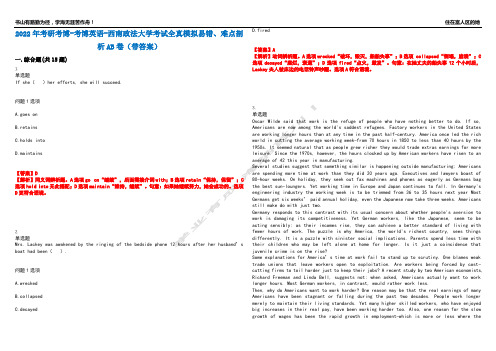
2022年考研考博-考博英语-西南政法大学考试全真模拟易错、难点剖析AB卷(带答案)一.综合题(共15题)1.单选题If she()her efforts, she will succeed.问题1选项A.goes onB.retainsC.holds intoD.maintains【答案】D【解析】同义词辨析题。
A选项go on“继续”,后面需接介词with;B选项retain“保持,保留”;C 选项hold into无此搭配;D选项maintain“维持,继续”。
句意:如果她继续努力,她会成功的。
选项D更符合语境。
2.单选题Mrs. Lackey was awakened by the ringing of the bedside phone 12 hours after her husband’s boat had been().问题1选项A.wreckedB.collapsedC.decayedD.fired【答案】A【解析】动词辨析题。
A选项wrecked“破坏,毁灭,船舶失事”;B选项collapsed“倒塌,崩溃”;C 选项decayed“腐烂,衰退”;D选项fired“点火,激发”。
句意:在她丈夫的船失事12个小时后,Lackey夫人被床边的电话铃声吵醒。
选项A符合语境。
3.单选题Oscar Wilde said that work is the refuge of people who have nothing better to do. If so, Americans are now among the world's saddest refugees. Factory workers in the United States are working longer hours than at any time in the past half-century. America once led the rich world in cutting the average working week-from 70 hours in 1850 to less than 40 hours by the 1950s. It seemed natural that as people grew richer they would trade extras earnings for more leisure. Since the 1970s, however, the hours clocked up by American workers have risen to an average of 42 this year in manufacturing.Several studies suggest that something similar is happening outside manufacturing: Americans are spending more time at work than they did 20 years ago. Executives and lawyers boast of 80-hour weeks. On holiday, they seek out fax machines and phones as eagerly as Germans bag the best sun-loungers. Yet working time in Europe and Japan continues to fall. In Germany's engineering industry the working week is to be trimmed from 36 to 35 hours next year Most Germans get six weeks’ paid annual holida y, even the Japanese now take three weeks. Americans still make do with just two.Germany responds to this contrast with its usual concern about whether people's aversion to work is damaging its competitiveness. Yet German workers, like the Japanese, seem to be acting sensibly: as their incomes rise, they can achieve a better standard of living with fewer hours of work. The puzzle is why America, the world's richest country, sees things differently. It is a puzzle with sinister social implications. Parents spend less time with their children who may be left alone at home for longer. Is it just a coincidence that juvenile crime is on the rise?Some explanations for America’s time at work fail to stand up to scrutiny. One blames weak trade unions that leave workers open to exploitation. Are workers being forced by cost-cutting firms to toil harder just to keep their jobs? A recent study by two American economists, Richard Freeman and Linda Bell, suggests not: when asked, Americans actually want to work longer hours. Most German workers, in contrast, would rather work less.Then, why do Americans want to work harder? One reason may be that the real earnings of many Americans have been stagnant or falling during the past two decades. People work longer merely to maintain their living standards. Yet many higher skilled workers, who have enjoyed big increases in their real pay, have been working harder too. Also, one reason for the slow growth of wages has been the rapid growth in employment-which is more or less where theargument began.Taxes may have something to do with it. People who work an extra hour in America are allowed to keep more of their money than those who do the same in Germany. Falls in marginal tax rates in America since the 1970s have made it all the more profitable to work longer.None of these answers really explains why the century-long decline in working hours has gone into reverse in America but not elsewhere (though Britain show signs of following America’s lead). Perhaps cultural differences -- the last refuge of the defeated economists--- are at play. Economists used to believe that once workers earned enough to provide for their basic needs and allow for a few luxuries, their incentive to work would be eroded, like lions relaxing after a kill. But humans are more susceptible to advertising than lions. Perhaps clever marketing has ensured that “basic needs” -- for a shower with built-in TV, for a rocket-propelled car—expand continuously. Shopping is already one of America’s most popular pastimes. But it requires money—hence more work and less leisure. Or try this, the television is not very good, and baseball and hockey keep being wiped out by strikes. Perhaps Wilde was right. Maybe Americans have nothing better to do.1.In the United States, working longer hours is().2.According to the third paragraph, which might be one of the consequences of working longer hours?3.Which of the following is the cause of working longer hours stated by the writer?问题1选项A.confined to the manufacturing industryB.a traditional practice in some sectorsC.prevalent in all sectors of societyD.favored by the economists问题2选项A.Rise in employees’ working efficiencyB.Rise in the number of young offendersC.Rise in people’s living standardsD.Rise in competitiveness 问题3选项A.Expansion of basic needsB.Cultural differencesC.Increase in real earningsD.Advertising【答案】第1题:C第2题:B第3题:A【解析】1.细节事实题。
2022年考研考博-考博英语-西南政法大学考试全真模拟易错、难点剖析AB卷(带答案)试题号:30
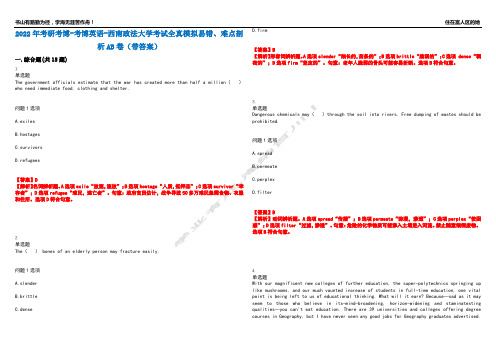
2022年考研考博-考博英语-西南政法大学考试全真模拟易错、难点剖析AB卷(带答案)一.综合题(共15题)1.单选题The government officials estimate that the war has created more than half a million()who need immediate food, clothing and shelter.问题1选项A.exilesB.hostagesC.survivorsD.refugees【答案】D【解析】名词辨析题。
A选项exile“放逐,流放”;B选项hostage“人质,抵押品”;C选项survivor“幸存者”;D选项refugee“难民,逃亡者”。
句意:政府官员估计,战争导致50多万难民急需食物、衣服和住所。
选项D符合句意。
2.单选题The() bones of an elderly person may fracture easily.问题1选项A.slenderB.brittleC.denseD.firm【答案】B【解析】形容词辨析题。
A选项slender“细长的,苗条的”;B选项brittle“脆弱的”;C选项dense“稠密的”;D选项firm“坚定的”。
句意:老年人脆弱的骨头可能容易折断。
选项B符合句意。
3.单选题Dangerous chemicals may()through the soil into rivers. Free dumping of wastes should be prohibited.问题1选项A.spreadB.permeateC.perplexD.filter【答案】B【解析】动词辨析题。
A选项spread“传播”;B选项permeate“弥漫,渗透”;C选项perplex“使困惑”;D选项filter“过滤,渗透”。
句意:危险的化学物质可能渗入土壤进入河流。
禁止随意倾倒废物。
2022年考研考博-考博英语-西南政法大学考试全真模拟易错、难点剖析AB卷(带答案)试题号:100
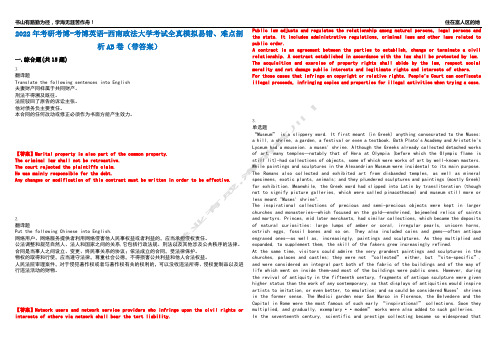
2022年考研考博-考博英语-西南政法大学考试全真模拟易错、难点剖析AB卷(带答案)一.综合题(共15题)1.翻译题Translate the following sentences into English夫妻财产同样属于共同财产。
刑法不得溯及既往。
法院驳回了原告的诉讼主张。
他对债务负主要责任。
本合同的任何改动或修正必须作为书面方能产生效力。
【答案】Marital property is also part of the common property.The criminal law shall not be retroactive.The court rejected the plaintiffs claim.He was mainly responsible for the debt.Any changes or modification of this contract must be written in order to be effective.2.翻译题Put the following Chinese into English.网络用户、网络服务提供者利用网络侵害他人民事权益或者利益的,应当承担侵权责任。
公法调整和规范自然人、法人和国家之间的关系,它包括行政法规、刑法以及其他涉及公共秩序的法律。
合同是当事人之间设立、变更、终民事关系的协议;依法成立的合同,受法律保护。
物权的取得和行使,应当遵守法律,尊重社会公德,不得损害公共利益和他人合法权益。
人民法院审理案件,对于侵犯著作权或者与著作权有关的权利的,可以没收违法所得、侵权复制品以及进行违法活动的财物。
【答案】Network users and network service providers who infringe upon the civil rights or interests of others via network shall bear the tort liability. Public law adjusts and regulates the relationship among natural persons, legal persons and the state. It includes administrative regulations, criminal laws and other laws related to public order.A contract is an agreement between the parties to establish, change or terminate a civil relationship. A contract established in accordance with the law shall be protected by law. The acquisition and exercise of property rights shall abide by the law, respect social morality and not damage public interests and legitimate rights and interests of others.For those cases that infringe on copyright or relative rights. People's Court can confiscate illegal proceeds, infringing copies and properties for illegal activities when trying a case.3.单选题“Museum” is a slippery word. It first meant (in Greek) anything consecrated to the Muses: a hill, a shrine, a garden, a festival or even a textbook. Both Plato's Academy and Aristotle's Lyceum had a mouseion. a muses' shrine. Although the Greeks already collected detached works of art, many temples—notably that of Hera at Olympia (before which the Olympic flame is still lit)-had collections of objects, some of which were works of art by well-known masters. While paintings and sculptures in the Alexandrian Museum were incidental to its main purpose. The Romans also collected and exhibited art from disbanded temples, as well as mineral specimens, exotic plants, animals; and they plundered sculptures and paintings (mostly Greek) for exhibition. Meanwhile, the Greek word had slipped into Latin by transliteration (though not to signify picture galleries, which were called pinacothecae) and museum still more or less meant "Muses' shrine".The inspirational collections of precious and semi-precious objects were kept in larger churches and monasteries—which focused on the gold—enshrined, bejeweled relics of saints and martyrs. Princes, mid later merchants, had similar collections, which became the deposits of natural curiosities: large lumps of amber or coral, irregular pearls, unicorn horns, ostrich eggs, fossil bones and so on. They also included coins and gems—often antique engraved ones—as well as, increasingly, paintings and sculptures. As they multiplied and expanded, to supplement them, the skill of the fakers grew increasingly refined.At the same time, visitors could admire the very grandest paintings and sculptures in the churches, palaces and castles; t hey were not “collected” either, but “site-specific”, and were considered an integral part both of the fabric of the buildings and of the way of life which went on inside them-and most of the buildings were public ones. However, during the revival of antiquity in the fifteenth century, fragments of antique sculpture were given higher status than the work of any contemporary, so that displays of antiquities would inspire artists to imitation, or even better, to emulation; and so could be considered Muses’ sh rines in the former sense. The Medici garden near San Marco in Florence, the Belvedere and the Capitol in Rome were the most famous of such early “inspirational” collections. Soon they multiplied, and gradually, exemplary ••modem” works were also added to such galleries.In the seventeenth century, scientific and prestige collecting became so widespread thatthree or four collectors independently published directories to museums all over the known world. But it was the age of revolutions and industry which produced the next sharp shift in the way the institution was perceived the fury against royal and church monuments promptedantiquarians to shelter them in asylum-galleries, of which the Musee des Monuments Francais was the most famous. Then, in the first half of the nineteenth century, museum funding tool off, allied to the rise of new wealth: London acquired the National Gallery and the British Museum, the Louvre was organized, the Museum-1nsel was begun in Berlin, and the Munich galleries were built. In Vienna, the huge Ktmsthistorisches and Naturhistorisches Museums took over much of the imperial treasure. Meanwhile, the decline of craftsmanship (and of public taste with it) inspired the creation of "improving" collections. The Victoria and Albert Museum in London was the most famous, as well as perhaps the largest of them.1.The sentence "Museum is a slippery word" in the first paragraph means that().2.The idea that museum could mean a mountain or an object originates from().3."...the skill of the fakers grew increasingly refined" in the third paragraph means that ().4.Paintings and sculptures on display in churches in the 15th century were().5.Modern museums come into existence in order to().6.Which is the main idea of the passage?问题1选项A.the meaning of the word didn't change until after the 15th centuryB.the meaning of the word had changed over the yearsC.the Greeks held different concepts from the RomansD.princes and merchants added paintings to their collections问题2选项A.the RomansB.FlorenceC.OlympiaD.Greek 问题3选项A.there was a great demand for fakersB.fakers grew rapidly in numberC.fakers became more skillfulD.fakers became more polite问题4选项A.collected from elsewhereB.made part of the buildingsC.donated by peopleD.bought by churches问题5选项A.protect royal and church treasuresB.improve existing collectionsC.stimulate public interestD.raise more funds问题6选项A.Collection and collectorsB.The evolution of museumsC.Modem museums and their functionsD.The birth of museums【答案】第1题:B第2题:D第3题:C第4题:B第5题:A第6题:B【解析】1.判断推理题。
2022年考研考博-考博英语-西南政法大学考试全真模拟易错、难点剖析AB卷(带答案)试题号:66

2022年考研考博-考博英语-西南政法大学考试全真模拟易错、难点剖析AB卷(带答案)一.综合题(共15题)1.单选题It’s our()that the new economic policy will bring great prosperity to this company. 问题1选项A.confidenceB.convictionC.recommendationD.insurance【答案】B【解析】名词辨析题。
A选项confidence“信心”;B选项conviction“确信”;C选项recommendation“推荐”;D选项insurance“保险”。
句意:我们相信新的经济政策会给公司带来巨大的繁荣。
选项B符合句意。
2.单选题Mr. Morton gradually()the knowledge of the subject.问题1选项A.attainedB.requiredC.acquiredD.enquired 【答案】C【解析】动词辨析题。
A选项attain“达到,实现”;B选项require“要求”;C选项acquire“获得,学到”;D选项enquire“询问”。
句意:Morton先生渐渐掌握了这门课程的知识。
选项C更符合语境。
3.单选题There is much discussion today about the need for the government to()the theatre.问题1选项A.substituteB.subsidizeC.subscribeD.subordinate【答案】B【解析】动词辨析题。
A选项substitute“代替”;B选项subsidize“资助”;C选项subscribe“签署,赞成”;D选项subordinate“使服从”。
句意:今天将重点讨论政府是否有必要对剧院进行补贴。
选项B符合句意。
4.单选题The founding of new China()people’s desire for independence.问题1选项A.declaredB.impliedC.manifestedD.announced【答案】C【解析】动词辨析题。
2022年考研考博-考博英语-西南政法大学考试全真模拟易错、难点剖析AB卷(带答案)试题号:43
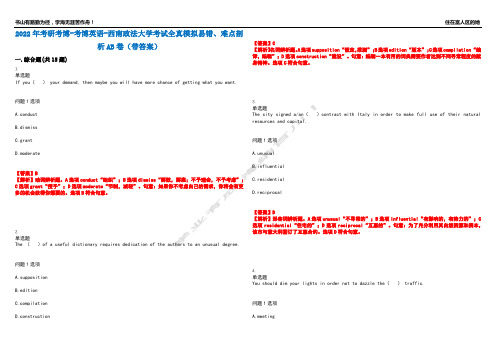
2022年考研考博-考博英语-西南政法大学考试全真模拟易错、难点剖析AB卷(带答案)一.综合题(共15题)1.单选题If you() your demand, then maybe you will have more chance of getting what you want.问题1选项A.conductB.dismissC.grantD.moderate【答案】B【解析】动词辨析题。
A选项conduct“组织”;B选项dismiss“解散,解雇;不予理会,不予考虑”;C选项grant“授予”;D选项moderate“节制,减轻”。
句意:如果你不考虑自己的需求,你将会有更多的机会获得你想要的。
选项B符合句意。
2.单选题The ()of a useful dictionary requires dedication of the authors to an unusual degree. 问题1选项A.suppositionB.editionpilationD.construction 【答案】C【解析】名词辨析题。
A选项supposition“假定,推测”;B选项edition“版本”;C选项compilation“编译,编辑”;D选项construction“建设”。
句意:编辑一本有用的词典需要作者达到不同寻常程度的献身精神。
选项C符合句意。
3.单选题The city signed a/an()contract with Italy in order to make full use of their natural resources and capital.问题1选项A.unusualB.influentialC.residentialD.reciprocal【答案】D【解析】形容词辨析题。
A选项unusual“不寻常的”;B选项influential“有影响的,有势力的”;C 选项residential“住宅的”;D选项reciprocal“互惠的”。
2022年考研考博-考博英语-西南政法大学考试全真模拟易错、难点剖析AB卷(带答案)试题号:76
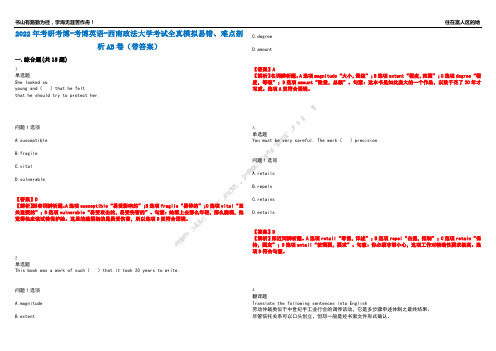
2022年考研考博-考博英语-西南政法大学考试全真模拟易错、难点剖析AB卷(带答案)一.综合题(共15题)1.单选题She looked soyoung and()that he feltthat he should try to protect her.问题1选项A.susceptibleB.fragileC.vitalD.vulnerable【答案】D【解析】形容词辨析题。
A选项susceptible“易受影响的”;B选项fragile“易碎的”;C选项vital“至关重要的”;D选项vulnerable“易受攻击的,易受伤害的”。
句意:她看上去那么年轻,那么脆弱,他觉得他应该试着保护她。
这里的脆弱指的是易受伤害,所以选项D更符合语境。
2.单选题This book was a work of such()that it took 20 years to write.问题1选项A.magnitudeB.extentC.degreeD.amount【答案】A【解析】名词辨析题。
A选项magnitude“大小,量级”;B选项extent“程度,范围”;C选项degree“程度,等级”;D选项amount“数量,总额”。
句意:这本书是如此庞大的一个作品,以致于花了20年才写成。
选项A更符合语境。
3.单选题You must be very careful. The work()precision.问题1选项A.retailsB.repelsC.retainsD.entails【答案】D【解析】形近词辨析题。
A选项retail“零售,详述”;B选项repel“击退,抵制”;C选项retain“保持,固定”;D选项entail“使需要,要求”。
句意:你必须非常小心,这项工作对精确性要求极高。
选项D符合句意。
4.翻译题Translate the following sentences into English劳动仲裁类似于中世纪手工业行会的调停话动,它是多步骤申述体制之最终结果。
2022年考研考博-考博英语-西南政法大学考试全真模拟易错、难点剖析AB卷(带答案)试题号:45
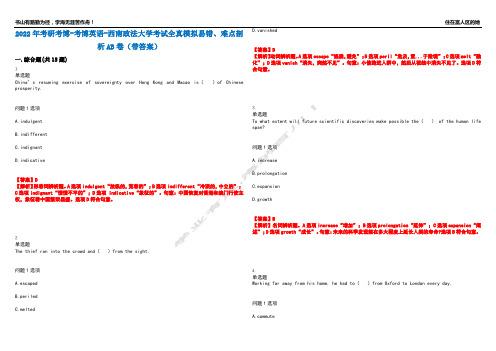
2022年考研考博-考博英语-西南政法大学考试全真模拟易错、难点剖析AB卷(带答案)一.综合题(共15题)1.单选题China’s resuming exercise of sovereignty over Hong Kong and Macao is()of Chinese prosperity.问题1选项A.indulgentB.indifferentC.indignantD.indicative【答案】D【解析】形容词辨析题。
A选项indulgent“放纵的,宽容的”;B选项indifferent“冷淡的,中立的”;C选项indignant“愤愤不平的”;D选项indicative“象征的”。
句意:中国恢复对香港和澳门行使主权,象征着中国繁荣昌盛。
选项D符合句意。
2.单选题The thief ran into the crowd and()from the sight.问题1选项A.escapedB.periledC.meltedD.vanished【答案】D【解析】动词辨析题。
A选项escape“逃脱,避免”;B选项peril“危及,置...于险境”;C选项melt“融化”;D选项vanish“消失,突然不见”。
句意:小偷跑进人群中,然后从视线中消失不见了。
选项D符合句意。
3.单选题To what extent will future scientific discoveries make possible the() of the human life span?问题1选项A.increaseB.prolongationC.expansionD.growth【答案】B【解析】名词辨析题。
A选项increase“增加”;B选项prolongation“延伸”;C选项expansion“阐述”;D选项growth“成长”。
句意:未来的科学发现能在多大程度上延长人类的寿命?选项B符合句意。
4.单选题Working far away from his home, he had to()from Oxford to London every day.问题1选项muteB.wanderC.rambleD.motion【答案】A【解析】动词辨析题。
2022年考研考博-考博英语-西南政法大学考试全真模拟易错、难点剖析AB卷(带答案)试题号:6
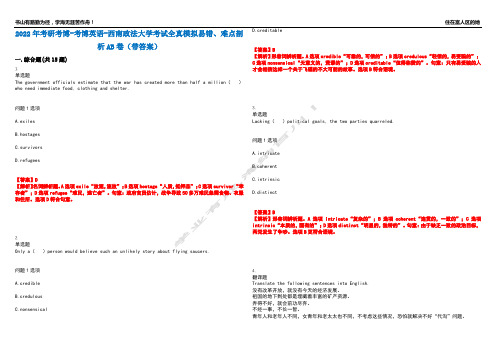
2022年考研考博-考博英语-西南政法大学考试全真模拟易错、难点剖析AB卷(带答案)一.综合题(共15题)1.单选题The government officials estimate that the war has created more than half a million()who need immediate food, clothing and shelter.问题1选项A.exilesB.hostagesC.survivorsD.refugees【答案】D【解析】名词辨析题。
A选项exile“放逐,流放”;B选项hostage“人质,抵押品”;C选项survivor“幸存者”;D选项refugee“难民,逃亡者”。
句意:政府官员估计,战争导致50多万难民急需食物、衣服和住所。
选项D符合句意。
2.单选题Only a()person would believe such an unlikely story about flying saucers.问题1选项A.credibleB.credulousC.nonsensicalD.creditable【答案】B【解析】形容词辨析题。
A选项credible“可靠的,可信的”;B选项credulous“轻信的,易受骗的”;C选项nonsensical“无意义的,荒谬的”;D选项creditable“值得称赞的”。
句意:只有易受骗的人才会相信这样一个关于飞碟的不大可能的故事。
选项B符合语境。
3.单选题Lacking()political goals, the two parties quarreled.问题1选项A.intricateB.coherentC.intrinsicD.distinct【答案】B【解析】形容词辨析题。
A选项intricate“复杂的”;B选项coherent“连贯的,一致的”;C选项intrinsic“本质的,固有的”;D选项distinct“明显的,独特的”。
- 1、下载文档前请自行甄别文档内容的完整性,平台不提供额外的编辑、内容补充、找答案等附加服务。
- 2、"仅部分预览"的文档,不可在线预览部分如存在完整性等问题,可反馈申请退款(可完整预览的文档不适用该条件!)。
- 3、如文档侵犯您的权益,请联系客服反馈,我们会尽快为您处理(人工客服工作时间:9:00-18:30)。
2022年考研考博-考博英语-西南政法大学考试全真模拟易错、难点剖析AB卷(带答案)一.综合题(共15题)1.单选题The()wind in this area is from the northeast.问题1选项A.prevailingB.controllingC.reigningD.persisting【答案】A【解析】形容词辨析题。
A选项prevailing“盛行的,流行的”;B选项controlling“控制欲强的”;C选项reigning“统治的”;D选项persisting“坚持”。
句意:这个地区盛行的风是东北风。
选项A符合句意。
2.单选题To()the risk of theft, install a good alarm system.问题1选项A.decreaseB.minimizeC.limitD.eliminate 【答案】D【解析】动词辨析题。
A选项decrease“减少,降低”;B选项minimize“最小化”;C选项limit“限制”;D选项eliminate“消除,排除”。
句意:为了消除被盗的风险,安装一个好的报警系统。
选项D 符合句意。
3.单选题I was always taught that it was() to interrupt.问题1选项A.rudeB.coarseC.roughD.crude【答案】A【解析】形容词辨析题。
A选项rude “粗鲁的,无礼的”;B选项coarse“粗糙的,粗俗的”;C选项rough“粗野的,粗略的”;D选项crude“天然的,未加工的”。
句意:我总是被教导打断别人说话是粗鲁的。
选项A符合句意。
4.单选题Each month 5 Yuan is()from my salary for house-repairing payment.问题1选项A.excludedB.expelledpelledD.docked【答案】D【解析】动词辨析题。
A选项exclude“排除”;B选项expel“驱逐,开除”;C选项compel“强迫”;D选项dock“使靠码头,从(工资)中扣除(一部分的钱)”。
句意:每个月从我的工资中扣去5元用于修房子。
选项D符合句意。
5.单选题You must be very careful. The work()precision.问题1选项A.retailsB.repelsC.retainsD.entails【答案】D【解析】形近词辨析题。
A选项retail“零售,详述”;B选项repel“击退,抵制”;C选项retain“保持,固定”;D选项entail“使需要,要求”。
句意:你必须非常小心,这项工作对精确性要求极高。
选项D符合句意。
6.单选题It is a()that in such a rich country there should be so many poor people. 问题1选项A.debateB.disputeC.dilemmaD.paradox【答案】D【解析】名词辨析题。
A选项debate“辩论,讨论”;B选项dispute“辩论,争吵”;C选项dilemma“困境,进退两难”;D选项paradox“悖论,自相矛盾的人或事”。
句意:在如此富裕的国家竟然有那么多穷人,这是一个多么矛盾的事情。
选项D符合句意。
7.单选题The system of exploitation of moon by man has been() .问题1选项A.canceledB.abolishedC.refusedD.rejected【答案】B【解析】动词辨析题。
A选项cancel“取消”;B选项abolish“废除,废止”;C选项refuse“拒绝”;D选项reject“拒绝,排斥”。
句意:人类开发月球的系统已经被废除。
选项B符合句意。
8.单选题Education in most of the developing world is shocking. Half of children in South Asia and athird of those in Africa who complete four years of schooling cannot read properly. Most governments have promised to provide universal primary education and to promote secondary education. But even when public schools exist, they often fail.The failure of state education, combined with the shift in emerging economies from farming to jobs that need at least a modicum of education, has caused a private-school boom. According to the World Bank, across the developing world a fifth of primary-school children are enrolled in private schools, twice as many as 20 years ago. So many private schools are unregistered that the real figure is likely to be much higher.By and large, politicians and educationalists are unenthusiastic. Governments see education as the state's job. NGOs tend to be ideologically opposed to the private sector. The U. N. Special rapporteur on education. Kishore Singh, has said that “for-profit education should not be allowed in order to safeguard the noble cause of education”.This attitude harms those whom educationalists claim to serve: children. The boom in private education is excellent news for them and their countries, for three reasons.First, it is bringing in money—not just from parents, but also from investors, some in search of a profit. Most private schools in the developing world are single operators that charge a few dollars a month, but chains are now emerging.Second, private schools are often better value for money than state ones. Measuring this is hard, since the children who go to private schools tend to be better off, and therefore likely to perform better. But a rigorous four-year study of 6, 000 pupils in Andhra Pradesh, in southern India, suggested that private pupils performed better in English and Hindi than public-school pupils, and the private schools achieved these results at a third of the cost of the public schools.Lastly, private schools are innovative. Since technology has great (though as yet mostly unrealized) potential in education, this could be important. Bridge gives teachers tablets linked to a central system that provides teaching materials and monitors their work. Such robo-teaching may not be ideal, but it is better than lessons without either material or monitoring.The private sector has problems. But the alternative is often a public school that is worse—or no school at all. The growth of private schools is a manifestation of the healthiest of instincts: parents’ desire to do the best for their children. Governments should therefore be asking not how to discourage private education, but how to boost it. Ideally, they would subsidize private schools, preferably through a voucher which parents could spend at the schools of their choice and top up; they would regulate schools to ensure quality; they would run public exams to help parents make informed choice.1.According to the author, the state governments in developing countries fail to().2.The author mentions Kishore Singh in order to show().3.Private schools surpass the public ones in that().4.What does the author think of the private education?5.Which of the following can be the title of the passage? 问题1选项A.provide proper education for all the school age childrenB.fulfill their promises by establishing enough public schoolsC.improve education quality of the existing public schoolsD.speed up the social shift from farming to manufacturing问题2选项A.how state governments dislike private educationB.why NGOs are so much opposed to private sectorsC.how we should safeguard the nobility of educationD.what the social mainstream thinks of the private school问题3选项A.they can obtain more money from parentsB.they have achieved better teaching qualityC.they can make better use of money and innovateD.they can use tablets to assist teaching问题4选项A.It meets the need of social development.B.It should be suspended and reorganized.C.It should not be run purely after high profits.D.It is encouraged to replace public education.问题5选项A.Why Are Private Schools Booming So Fast?B.Should Private Education Be Helped or Curbed?C.How Should the Government Improve Education?D.What Should the State Do with Public Schools?【答案】第1题:B第2题:B第3题:C第4题:A第5题:B【解析】1.判断推理题。
